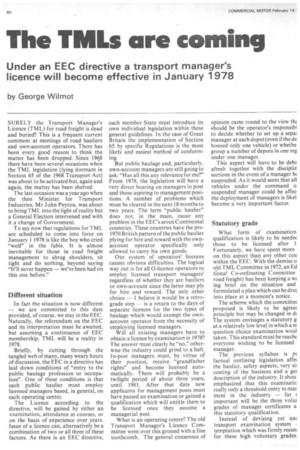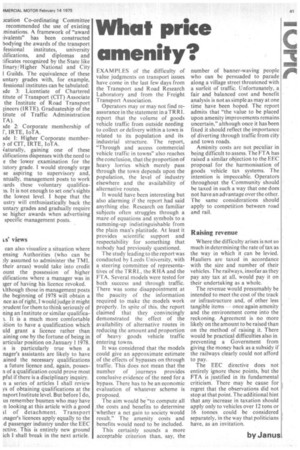The Trins are coming
Page 42

Page 43

If you've noticed an error in this article please click here to report it so we can fix it.
Under an EEC directive a transport manager's licence will become effective in January 1978
by George Wilmot
SURELY the Transport Manager's Licence (TML) for road freight is dead and buried? This is a frequent current comment at meetings of road hauliers and own-account operators. There has been every good reason to think the matter has been dropped. Since 1968 there have been several occasions when the TML legislation (lying dormant in Section 65 of the 1968 Transport Act) was about to be activated but, again and again, the matter has been shelved.
The last occasion was a year ago when the then Minister for Transport Industries, Mr John Peyton, was about to bring TML into the light of reality but a General Election intervened and with it a change of Government.
To say now that regulations for TML are scheduled to come into force on January 1 1978 is like the boy who cried "wolf' in the fable. It is almost inevitable for those in road freight management to shrug shoulders, sit tight and do nothing, beyond saying "It'll never happen — we've been had on this one before."
Different situation
In fact the situation is now different — we are committed to this date provided, of course, we stay in the EEC. Naturally, the referendum on the EEC and its interpretation must be awaited, but assuming a continuance of EEC membership, TML will be a reality in 1978.
Briefly, by cutting through the tangled web of many, many weary hours of discussion, the EEC in a directive has laid down conditions of "entry to the public haulage profession or occupation". One of these conditions is that each public haulier must employ licensed managers based, in general, on each operating centre.
The Licence according to the directive, will be gained by either an examination, attendance at courses, or on the basis of experience over years. Issue of a licence can, alternatively be a combination of two or all three of these factors. As there is an EEC directive, each member State must introduce its own individual legislation within these general guidelines. In the case of Great Britain the implementation of Section 65 by specific Regulations is the most likely and easiest method of conforming.
But public haulage and, particularly, own-account managers are still going to ask: "Has all this any relevance for me?" From 1978, the legislation will have a very direct bearing on managers in post and those aspiring to management positions. A number of problems which must be cleared in the next 18 months to two years. The term "public haulier" does not, in the main, cause any problem in the EEC's seven Continental countries. These countries have the pre1970 British pattern of the public haulier plying for hire and reward with the ownaccount operator specifically only allowed to carry his own goods.
Our system of operators' licences causes obvious difficulties. The logical way out is for all 0-licence operators to employ licensed transport managers' regardless of whether they are hauliers or own-account since the latter may ply for hire and reward. The only other choice — I believe it would be a retrograde step — is a return to the days of separate licences for the two types of haulage which would exempt the ownaccount operator from the necessity of employing licensed managers.
Will all existing managers have to obtain a licence by examination in 1978? The answer must clearly be "no." otherwise the industry could grind to a halt. In-post managers must, by virtue of their position, receive "grandfather rights" and become licensed automatically. There will probably be a twilight period of about three years, until 1981. After that date new applicants for management posts must have passed an examination or gained a qualification which will entitle them to be licensed once they assume a managerial post.
What is an operating centre? The old Transport Manager's Licence Committee went over this ground with a fine toothcomb. The general consensus of opinion came round to the view thg should be the operator's responsibi to decide whether to set up a sepa manager at each depot (even if the de housed only one vehicle) or whethe group a number of depots in one reg under one manager.
This aspect will have to be debt afresh together with the disciplir sections in the event of a manager Ix suspended. As it would seem that all vehicles under the command o suspended manager could be affec the deployment of managers is likel become a very important factor.
Statutory grade
What form of examination qualification is likely to be neede( those to be licensed after I Fortunately, we have spent more on this aspect than any other cou within the EEC. With the demise o old TML Committee in 1972, an Ed tional Co-ordinating Committee road freight) has been keeping a wg ing brief on the situation and formulated a plan which can be drol into place at a moment's notice.
The scheme which the committe( proposed is likely to be agree( principle but may be changed in di The system envisages a statutory g at a relatively low level in which a in question choice examination woul taken. This standard must be reach( everyone wishing to be licensed manager.
The previous syllabus is 1)1 factual outlining legislation affe4 the haulier, safety aspects,. very sii costing of the business and a gei description of the industry. It shou emphasized that this examinatic really only a threshold entry to mar ment in the industry — far important will be the three volut grades of manager certificates a this statutory qualification.
Instead of devising yet am transport examination system temptation which was firmly resist for these high voluntary grades ication Co-ordinating Committee recommended the use of existing minations. A framework of "award iivalents" has been constructed bodying the awards of the transport fessional institutes, university difications, and diplomas and ificates recognized by the State like Unary/ Higher National and City 1 Guilds. The equivalence of these untary grades with, for example, fessional institutes can be tabulated: ide 3: Licentiate of Chartered titute of Transport (CIT) Associate the Institute of Road Transport ;ineers (IRTE). Graduateship of the titute of Traffic Administration tA).
de 2: Corporate membership of r, IRTE, loTA.
1de 1: Higher Corporate memberof CIT, IRTE, IoTA.
iaturally, gaining one of these tlifications dispenses with the need to e the lower examination for the tutory grade. I would strongly urge se aspiring to supervisory and, ntually, management posts to work rards these voluntary q ualificaIs. It is not enough to set one's sights the lowest level. I hope that the ustry will enthusiastically back the untary grades and gradually require se higher awards when advertising specific management posts.
Ls' views
can also visualize a situation where ensing Authorities (who can be !ly assumed to administer the TM L their areas) would take into credit ount the possession of higher tlifications where a manager was in 'ger of having his licence revoked. Uthough those in management posts the beginning of 1978 will obtain a nce as of right,! would judge it might lrudent for them to think seriously of ning an Institute or similar qualifica1. It is a much more comfortable ition to have a qualification which uld grant a licence rather than aining one by the fortune of being in articular position on January 11978. is is particularly true when a nager's assistants are likely to have ained the necessary qualifications a future licence and, again, possesFl of a qualification could prove most pful if there is a disciplinary inquiry. n a series of articles I shall review vs of obtaining qualifications at the nsport Institute level. But before I do, us remember busmen who may have :n looking at this article with a good 11 of detachment. Transport tnager's licences apply equally to the .d passenger industry under the EEC r...ctive. This is entirely new ground ich I shall break in the next article.




































































































